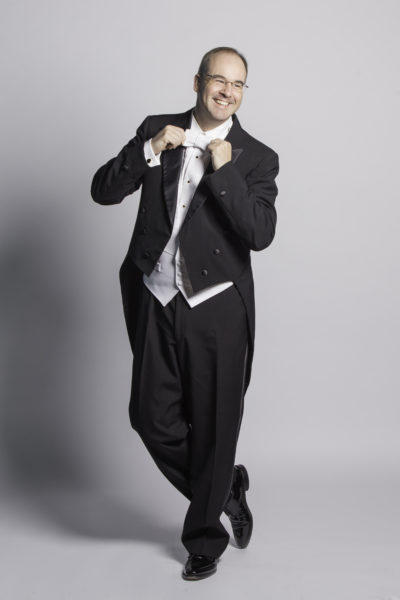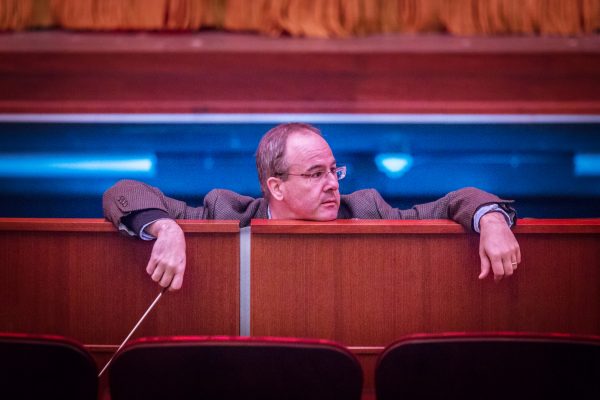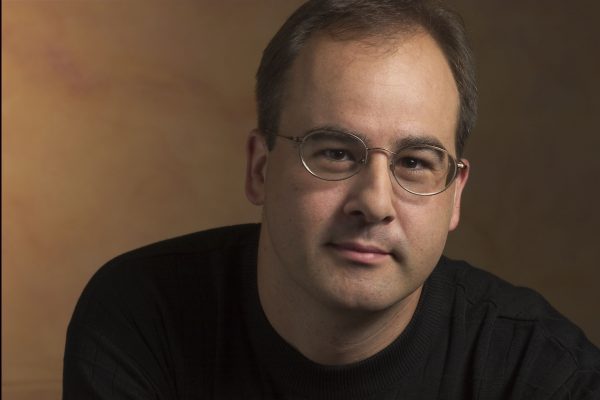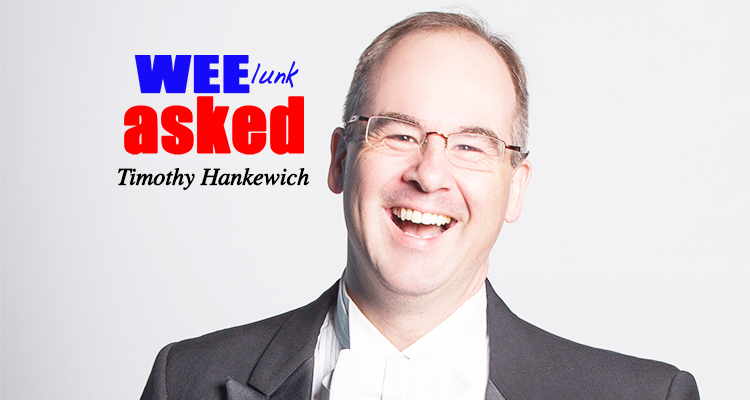Editor’s note: We are changing up our WEEasked series a few times over the next several months, asking specific questions to the candidates vying for the position of Wheeling Symphony music director. There are five conductors in the running, and each one will have a shot at answering the same questions, with the answers posting a few days before their concert.
Timothy Hankewich is a “total foodie,” a country music lover and a sci-fi nerd. In fact, as he shares below, “underneath my tails attached to my suspenders is my most prized piece of jewelry: a Star Trek communicator pin.”
Fun fact: I am a sci-fi nerd. During every concert, unbeknownst to the audience, underneath my tails, attached to my suspenders, is my most prized piece of jewelry: a Star Trek communicator pin. Some would consider it a good luck charm. I view it as a backup emergency exit plan in case things go horribly wrong on stage. — Tim Hankewich
Beam him up, Scottie — right up to the conductor’s podium in front of the WSO on Friday.
At 7:30 p.m. Friday, Sept. 21, he’ll be conducting a fun, fun, fun program: “Surf’s Up! A Tribute to the Beach Boys.” Under Hankewich’s baton, Phil Dirt and the Dozers, along with the WSO, will play such favorites as “California Girls,” “God Only Knows,” “Help Me Rhonda,” “Surfin’ USA” and others.
Here is what Tim said when WEEasked:
1. Tell us about yourself … some highlights of your professional career, training and education.

I was born and raised in a very small town in Northern British Columbia called Dawson Creek. It’s about a 14-hour drive north of the Washington Border — lots of hard-working people there making a living working in agriculture, forestry, mining or in the oil patch.
Though very isolated, it made for a great childhood with a surprisingly active arts presence. I learned early how music and the arts importantly can contribute to the vitality of a community no matter its size. Because of the isolation, there was a hunger for people to reach out to each other, through the arts. My first piano teacher emigrated from Germany (her husband found work on the oil rigs), and every year she managed to put on an opera, of all things. The whole town would shut down to either participate in the production or attend its performances. Here I was, a 6-year-old kid, and my family was dragging me to “Magic Flute” rehearsals — I thought everybody did that.
A new community college started a music program when another mentor came to town to start a choir — he was the first example of what a truly professional musician could be.
By this time, I was getting pretty good as a pianist, and I started studying at the nearest University in Edmonton (a four- to five-hour drive away from Dawson Creek). I was only 14, and once a month, my dad would drive me to the nearest airport, I would fly to Edmonton alone, take a cab to the university, grab a quick bite to eat, have a piano and theory lesson in time to catch the return flight to be back home in bed by midnight the same day.
The die had been cast — I knew early on I was going to be a musician for the rest of my life. I went to the University of Alberta in Edmonton (where I met my wife) for my undergrad in piano performance followed by a master’s degree in choral conducting. We then came to the United States where I gained a doctorate in instrumental conducting from Indiana University. I wasn’t expecting to stay in the U.S., but life had other things in store for me. I was appointed as a conducting fellow with the Indianapolis Symphony, followed by an invitation to join the Oregon Symphony as an apprentice conductor, during which time I won the Aspen conducting award. From there, I joined the Evansville Philharmonic in Indiana for a season as their assistant conductor, where I ran their chorus and youth orchestra, before winning a position with the Kansas City as their resident conductor. Finally, I garnered a music directorship of my own with Orchestra Iowa where my wife and I have lived for the last 13 years. During this time, I became a U.S. citizen and successfully steered my orchestra through an existential crisis — in 2008, Cedar Rapids was drowned by a catastrophic flood. Everything was destroyed: the downtown urban core, the theater, the symphony offices and all our ticket/patron data, and all equipment and instruments except our library. Despite long odds, I’m happy to report that we pulled through with flying colors. Coming full circle, the reason we survived was because of the strong relationship the orchestra had with its community — if there is one overarching lesson, it’s that the arts are meant to bring people and communities together.
2. Tell us something personal you’d like your audiences to know about you.
I’m a total foodie!!! I love to eat, I love to go out to eat, I love to cook (to eat) — did I mention I like food? Good wine and good company over a meal is paradise to me. As a result, I have to exercise/run fairly often so that things don’t get out of hand. Let me be clear … I don’t enjoy the exercise or view it as some sort of hobby, but rather as necessary penance to support my true love … FOOD.
Fun fact: I am a sci-fi nerd. During every concert, unbeknownst to the audience, underneath my tails, attached to my suspenders, is my most prized piece of jewelry: a Star Trek communicator pin. Some would consider it a good luck charm. I view it as a backup emergency exit plan in case things go horribly wrong on stage.

3. How do you see yourself incorporating the changing landscape of orchestral music with the Wheeling Orchestra?
In essence, the way an orchestra effectively adapts to the shifts in our industry is to strive to be a meaningful part of a community’s identity and to effectively serve the unique needs of its increasingly diverse audiences. In short, look local to find your future.
4. How do you see the community playing a part in the role of the Wheeling Symphony’s music director?
Every orchestra faces the same challenges, yet the specific strategies in how one faces them will differ from orchestra to orchestra. As alluded in my brief biography, the health and relevance of an orchestra are grounded upon the relationship it fosters with its community. What role is it taking in the area’s education? How is it contributing to the economic well-being of the community? Are other organizations and music programs (public or private) benefiting from the orchestra’s expertise? Are you partnering with other organizations to create something unique or better than without? Are you catering to the entire community or just a small segment? These are some of the questions that we should be asking ourselves every day. These questions are then answered by how, where and what we play, and the solutions will be infinitely varied. Will it be all classical? No — it can’t be. Some avenues will include film, world/multi-cultural music, popular music (I tend to like country), possibly new music, jazz, ballet, opera, etc. At the end of the day, excellent programming must have the diversity of music that mirrors the cultural profile of the community it serves.
But the orchestra can and must take the lead in important areas of city development as well. Too often, they sit idly by immersed in their own worlds letting others do the heavy lifting of community building. The music director is the face and symbol of the entire organization, which is important why he/she should represent the orchestra by being a member of a business/service club like Rotary, Kiwanis or the Lions club, etc. It’s important that they participate in the boards of other organizations, and if possible, contribute to municipal discussions about city planning. If an orchestra and its music director move in these directions, then a happy side effect is a relevant successful organization that’s in tune with its community.

5. Who is your favorite composer? Why?
There is a lot of great music out there, but I would have to say my favorite is J.S. Bach. When it comes to composing, he plays three-dimensional chess where everyone else stumbles at checkers. The fusion of the heart and mind or the spiritual and the intellectual is beyond perfect. The deeper I study any work of his, the more my mind boggles finding layer after layer of technical brilliance. When you look under the hood of what he’s doing, he can just make every note count and every note dance to his whim.
My other favorite is Mahler — because of its sheer raw power, orchestrational complexity and the unique conducting challenges his music presents — every instrument gets a workout, and since Mahler was a conductor himself, he writes in a manner that makes the music director indispensable (that implies correctly that there are pieces out there where a conductor isn’t that necessary for a successful performance).
6. What’s your favorite non-classical music style?
There is a ton of stuff out there that I love. I tend to like the classic ’70s-’80s bands like the Eagles, Chicago, Queen, Blood Sweat and Tears. I’m a huge fan of Wynona Judd, and when I grew up, my dad would play nothing but Johnny Cash, Hank Snow and Merle Haggard. Lately, though, I’ve been on a jazz kick. Fact is, I’ll listen to almost anything so long as it’s thoughtfully put together and clearly takes talent and expertise to perform it well.
7. What’s on your current playlist?
My favorite playlist is a compilation that I’ve named “Dinner Jazz.” When we have people over (usually for a dinner party), it’s my go-to music: Frank Sinatra, Ella Fitzgerald, Nat King Cole, Oscar Peterson, Swingle Singers, Wycliffe Gordon, Louis Prima, Andrew Sisters … in short, happy music!
• For more information about Friday’s concert, read Saturday’s story about the season opener.


